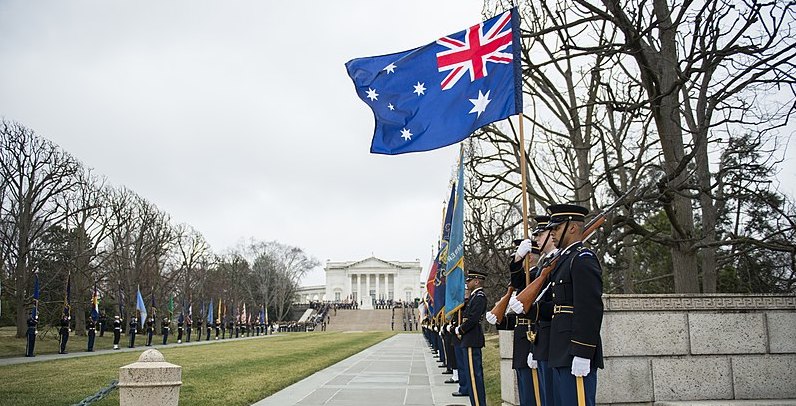
Australia: National Anthems, Miscellaneous Ramblings
My essay, “Vanishing National Anthems,” was published by the Hillsdale College Churchill Project. For the original article with images and all the lyrics (including those now abandoned) of five National Anthems (Britain, Canada, Australia, New Zealand, USA), click here. To subscribe to weekly articles from Churchill-Hillsdale, click here, scroll to bottom, and fill in your email in the box entitled “Stay in touch with us.” Your email is never divulged and remains a riddle wrapped in a mystery inside an enigma.
“Frustrate their knavish tricks”
A friend in Australia writes so many things of interest that I thought I would share them with readers. If you think this forsakes history and overindulges in personal opinion, say so and I will hit it on the head. It it “goes viral,” as unlikely as that seems, all bets are off.
Our conversation began with national anthems. We share a mutual love of Finlandia, that epic composition by Jean Sibelius. If you like Finlandia, watch this flash mob at Helsingfors Railway Station. It is not the official Finnish National Anthem, but it will send shivers down your spine.
We segued into the anthem of Latvia, my great-great grandmother’s homeland, where we bicycled the coast in 1995. Here is Dievs Svētī Latviju, sung at the annual Latvian song festival.
We turned to the obscure or omitted verses of our own countries’ anthems. I will bet most readers never heard verse 3 of The Star-Spangled Banner or verse 2 of God Save the King. They are rather bloodthirsty. Click on my article to read them all.
In her memoir, A Daughter’s Tale, Mary Soames wrote of the great service of thanksgiving at St. Paul’s Cathedral five days after V-E Day, 1945: “Such was the mood that we were allowed to sing the second verse of the National Anthem (usually a real no-no), bidding God arise to scatter the King’s enemies (Confound their politics / Frustrate their knavish tricks).”
Well, at a Churchill Conference in 2000, we entertained Lady Soames with all five verses of God Save the Queen, including that one. She was sure we were going way over the top.
Advance Australia Fair
My Australian friend writes:
Do you like our noble national anthem? Until 1984 it was God Save the Queen. Then we adopted one written by a Scotsman on a bus. It starts “Australians all let us rejoice / For we are young and free / We’ve golden soil / And wealth for toil / Our home is girt by sea.”
Two years ago the second line was changed to “For we are one and free.” Somebody realised that our physical country, is very, very old and that its Aboriginal population had been here a very long time. Don’t you love the word “girt” in our anthem? I think it’s a word not understood by most, but we sing it anyway.
I do like it. Churchill used “girt” a dozen times. Although sometimes advocated, Australia will probably never exchange its anthem for that wonderful bush ballad Waltzing Matilda, which immortalizes a sheep-stealer.
Alan Keyes beautifully sang Advance Australia Fair at the 1993 Churchill Conference. Along with God Defend New Zealand and the US-UK-Canada anthems. (Alan grew up hoping to be either an opera singer or a politician. He chose the latter, running against Barack Obama for the U.S. Senate. He once mused to me about how he might have made out with opera.)
Monarchy, Republic, Commonwealth
They’ll say Australia will avoid that problem by electing as president some nonagenarian ex-leader or elder. But electing makes it political. There’s something to be said for having a hereditary monarch who is not a politician. If, that is, the incumbent avoids expounding about his or her favorite politics. Anyway, Her Late Majesty saw fit to honor me with a distinction she thought warranted. So I am about as loyal to the Crown as any foreigner could be.
In the Bahamas, where we spent winters for forty years, the locals still like the monarchy. The judges and advocates wear wigs, and the Privy Council is their final court of appeal. But the Chinese are buying up the Bahamas as fast as they did Barbados, and money talks. In 2021 Barbados became a republic. A Barbadian said: “The politicians never asked us. The most they could ever get for abolishing the Monarchy was 24%. Follow the money….”
Compulsory voting
America’s interminable electioneering
“Australians don’t rate politics the way Americans do,” my friend writes. “I was astonished when I was living in America how vital a part of your lives it is. (Or was then.) It seems Aussies can’t take too much of it at one time! ‘I take an interest,’ says Mrs. Wititterly in Nicholas Nickleby, with a faint smile, ‘such an interest in the drama.'”
She is right. Politics is much more of an indulgence in the United States. (And American elections are ridiculously interminable—in Australia they take three months. But that is another subject. Follow the money….)
Why are Americans so political? Tocqueville observed nearly 200 years ago that much American politics is local. Speaker of the House Tip O’Neill echoed the sentiment. That stems from being a federal republic with enormous rights reserved to the states, local governments or people.
Nobody understands our Electoral College, which elects presidents based on state pluralities—and why that’s superior, in a country this big, to a direct election. But it is, in a federal system, and the Founders knew why. Few Americans today know, because Civics isn’t taught. The big danger is centralization of power. Whether America’s government is better than a parliamentary system I’m no longer sure. I used to be. But then came the last couple of decades.






